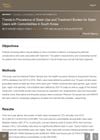 16 citations,
November 2018 in “Singapore Medical Journal”
16 citations,
November 2018 in “Singapore Medical Journal” Primary care for PCOS focuses on lifestyle changes, medication based on symptoms, and mental health, with diabetes screening and specialist referral for severe cases.

The document concludes that accurate diagnosis and management of PCOS are crucial due to its associated health risks.
 467 citations,
October 2014 in “European Journal of Endocrinology”
467 citations,
October 2014 in “European Journal of Endocrinology” The European Society of Endocrinology advises individualized long-term management for PCOS, focusing on lifestyle changes, accurate diagnosis, and treatments for associated health risks and symptoms.
[object Object]  52 citations,
February 2018 in “Diabetology & Metabolic Syndrome”
52 citations,
February 2018 in “Diabetology & Metabolic Syndrome” Some skin conditions may indicate metabolic syndrome, which could help with early detection and management of related health issues.
 86 citations,
October 2017 in “Translational pediatrics”
86 citations,
October 2017 in “Translational pediatrics” Skin changes can help diagnose and manage endocrine disorders like thyroid problems, diabetes, and adrenal gland conditions.
 53 citations,
June 2012 in “Annales d'Endocrinologie”
53 citations,
June 2012 in “Annales d'Endocrinologie” The document concludes that recognizing and properly diagnosing lipodystrophy syndromes is crucial for effective management and treatment.
 October 2023 in “International Journal For Multidisciplinary Research”
October 2023 in “International Journal For Multidisciplinary Research” Women with PCOS face many health risks, but exercise, a healthy diet, and weight management can help.
 March 2023 in “Scholars international journal of obstetrics and gynecology”
March 2023 in “Scholars international journal of obstetrics and gynecology” PCOS is a complex condition that affects women's hormonal balance and metabolism, requiring lifestyle changes and medical management.
 4025 citations,
December 2003 in “Human Reproduction”
4025 citations,
December 2003 in “Human Reproduction” The 2003 consensus updated PCOS diagnosis criteria and linked PCOS to higher risks of diabetes and heart problems, recommending lifestyle changes to lower these risks.
 883 citations,
August 2016 in “Nature Reviews Disease Primers”
883 citations,
August 2016 in “Nature Reviews Disease Primers” Polycystic Ovary Syndrome (PCOS) is a common condition in women that can cause metabolic, reproductive, and psychological issues, and requires lifestyle changes and medication for management.
10 citations,
September 2021 in “American Journal of Medical Genetics Part A” Woodhouse-Sakati syndrome shows varied symptoms, including hair loss and diabetes, and is common in Qatar due to a specific genetic variant.
 7 citations,
July 2019 in “Advances in preventive medicine”
7 citations,
July 2019 in “Advances in preventive medicine” Most diabetic patients have skin problems, which are more common with longer diabetes duration and poor blood sugar control.
 December 2021 in “Journal of oncology research reviews & reports”
December 2021 in “Journal of oncology research reviews & reports” Polycystic Ovary Syndrome (PCOS) can lead to diabetes, heart disease, cancer, and mental health problems.
 October 2018 in “International journal of reproduction, contraception, obstetrics and gynecology”
October 2018 in “International journal of reproduction, contraception, obstetrics and gynecology” Higher testosterone levels in Nigerian women with PCOS are linked to glucose disorders like diabetes.
 2 citations,
May 1999 in “PubMed”
2 citations,
May 1999 in “PubMed” Hyperandrogenism in women can cause acne, hair growth, hair loss, irregular periods, and increase the risk of infertility and diabetes.
 August 2008 in “Obstetrics & gynecology science”
August 2008 in “Obstetrics & gynecology science” Polycystic Ovary Syndrome (PCOS) is a complex disorder with both immediate and long-term health effects, including menstrual issues, infertility, and increased risk of diabetes and heart disease.
 34 citations,
May 2017 in “Seminars in Reproductive Medicine”
34 citations,
May 2017 in “Seminars in Reproductive Medicine” Women with PCOS have a higher risk of diabetes, heart problems, certain cancers, and mental health issues, but early treatment can help manage these risks.
9 citations,
February 2007 in “JAMA” PCOS is a common inherited condition causing cysts, irregular periods, and increased diabetes risk in women.
 3 citations,
November 2015 in “Endocrinology, Diabetes & Metabolism Case Reports”
3 citations,
November 2015 in “Endocrinology, Diabetes & Metabolism Case Reports” Ring Chromosome 11 may be linked to conditions like early puberty, excessive hair growth, hair loss, and type 2 diabetes.
 October 2016 in “Journal of the Dermatology Nurses’ Association”
October 2016 in “Journal of the Dermatology Nurses’ Association” Polycystic Ovary Syndrome (PCOS) affects 6%-15% of women of reproductive age, causing symptoms like acne and hair loss, and increasing the risk of type 2 diabetes and heart disease; it's managed through diet, exercise, and medications like Metformin and hormonal contraceptives.
[object Object]  11 citations,
November 2017 in “Hong Kong Medical Journal”
11 citations,
November 2017 in “Hong Kong Medical Journal” Polycystic ovary syndrome increases the risk of diabetes, heart disease, and endometrial cancer, and requires early treatment to manage these risks.

The article concludes that better diagnosis and management of Polycystic Ovarian Syndrome are needed to improve women's health and prevent related diseases.
 November 2024 in “IP Indian Journal of Clinical and Experimental Dermatology”
November 2024 in “IP Indian Journal of Clinical and Experimental Dermatology” Certain skin conditions can indicate a higher risk of diabetes and heart problems.
 89 citations,
November 2014 in “Medical Clinics of North America”
89 citations,
November 2014 in “Medical Clinics of North America” Eating 500 fewer calories a day and making lifestyle changes can improve PCOS symptoms and reduce diabetes risk; more research is needed on its causes and treatments.
 4 citations,
March 2006 in “Journal of renal nutrition”
4 citations,
March 2006 in “Journal of renal nutrition” Dialysis patients benefit from water-soluble vitamins but need careful management to avoid risks.
 1 citations,
May 2009 in “Wiley-Blackwell eBooks”
1 citations,
May 2009 in “Wiley-Blackwell eBooks” Early treatment of PCOS in teens is crucial to prevent long-term health issues like diabetes and heart disease.
11 citations,
July 2019 in “International journal of women’s dermatology” Certain skin conditions in women are linked to higher risks of metabolic syndrome and type 2 diabetes due to hormone imbalances.
3 citations,
January 2022 in “Anais Brasileiros De Dermatologia” Androgenetic alopecia in teens is linked to obesity and other metabolic risks, needing early diagnosis and management.
 2 citations,
March 2016 in “InnovAiT”
2 citations,
March 2016 in “InnovAiT” PCOS is a common hormonal disorder in women, often involving menstrual issues and increased diabetes risk, managed through lifestyle changes and targeted treatments.
 September 2018 in “Value in Health”
September 2018 in “Value in Health” More people in South Korea are using statins each year, especially those with diabetes, muscle pain, and heart disease, leading to higher medical costs.


























